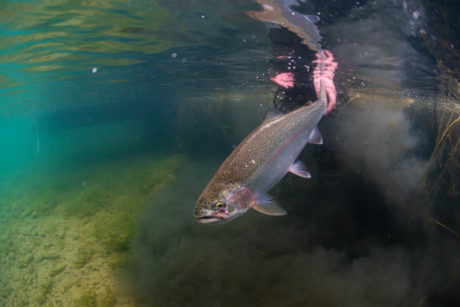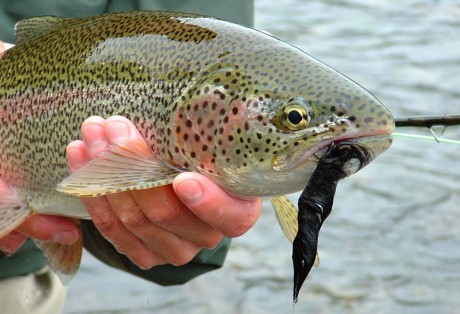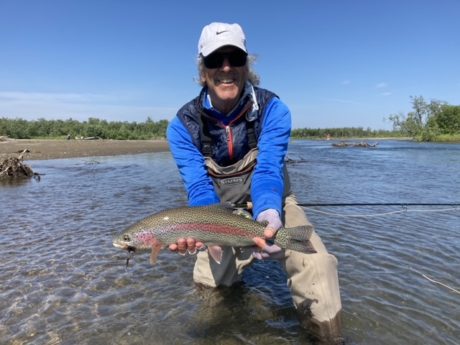
More fun than a frog in a glass of milk. Okay, we’re not exactly sure what that means either, but we’re sure it means it is hootenanny when it comes to Rainbow Trout Fishing in Alaska. In this week’s Deneki Chronicles, we can’t help but get excited about Rainbow Trout Fishing. Have a gander.

Alaskan trout tend to behave differently from their brethren in the lower 48. As we mentioned last week, that warrants some rather uncommon methods when targeting trout in Alaska compared to those used in other parts of the world.
With different methods come different techniques, and today we present you with 5 lesser-known tips to catch more trout, the Alaskan way.
- Dead-drift Streamers. It’s no secret that baitfish (sculpins, salmon smolt, etc.) make up an important part of the diet for large trout, making streamers extremely effective throughout the entire season. However, with so much protein-rich food available in the form of free-floating salmon eggs and flesh, big trout can become reluctant to move for a quickly stripped streamer during the back half of our season. Why expend energy chasing down a sardine, when you can have a steak-and-egg breakfast in bed, right? For this reason, dead-drifting a streamer, much like you would a nymph, can be very effective. Not only does it require less of an aggressive reaction out of a potentially wary fish, but it also allows for better control of the fly into tighter holding lies. Throw in a slight twitch every now and then during the drift, and hold on!
- When Mousing, Try a Strip-Set. Although takes can be ferocious, those who have skated mouse patterns for trout know that keeping them hooked after the take can be challenging. The visual of trout eating a mouse pattern tends to get people excited (hey, we get it), often resulting in a premature lift of the rod without actually allowing the fish to take hold of the fly for a solid hook set. Instead, we’ve found that concentrating on setting the hook using a strip-set (much like you would on the flats) actually makes for better hook sets, resulting in more fish to hand. Why? We think it’s largely due to the fact that the rod tip must first be lowered, giving the fish slightly more time to take the fly under before the hook is driven home. We typically use ‘tippet’ in the 15 or even 20 lb. range when mousing for trout at Alaska West, so setting the hook with a raise of the rod to ‘protect’ delicate tippet is unnecessary. Give it a try!
- Be Willing to Lose Flies. Large trout the world over often seek comfort in the lies that are most difficult to deliver a fly to. In Alaska, due to such a high abundance of extremely high-caloric food, it’s arguable that trout can spend even more time in these tight holding spots while getting fed extremely well in the process. Thus, when looking for large trout, fishing extremely tight to structure is critical. That takes a willingness to break off flies now and then, but trust us, it pays off.
- Ditch the 5-Weight. Alaskan trout can get big. They’re also most often targeted with heavily weighted streamers, split-shot laden flesh and egg rigs, and/or wind-resistant rodent imitations. All reasons that render a 5-weight a tad under-gunned. Don’t get us wrong, a 5-weight can get it done. So can a 6-weight. However, if given a choice, we’d take a 7-weight every time.
- Fish Black and Blue. Most trout anglers love the notion of imitating a trout’s natural prey with their offerings. In contrast, most salmon/steelhead anglers accept the fact that exact imitation is not overly important, often fishing outrageously flamboyant fly patterns in hopes to elicit some sort of instinctual or aggressive response to eat the fly. Our observation? When fishing funky color flies for salmon, we tend to catch a lot of big trout as well. What color in particular? Black and blue. Give it a shot.

Leave a Reply